Introduction
Do Rabbits Hibernate: Rabbits are adapted to cope with colder temperatures and limited food availability in a way that doesn’t involve hibernation. They are crepuscular animals, which means they are most active during dawn and dusk. This behavior helps them take advantage of slightly warmer temperatures during these times while minimizing exposure to the coldest parts of the day.
During the winter, rabbits eat rely on their natural adaptations to stay warm and nourished. Their dense fur provides insulation, trapping a layer of warm air close to their bodies. Additionally, rabbits possess an efficient digestive system that allows them to extract more nutrients from the food they consume, helping them sustain themselves with limited resources.
While rabbits do not hibernate, they do exhibit a behavior known as “winter lethargy” or “seasonal torpor.” This is a lighter form of torpor compared to hibernation and involves a decrease in activity, metabolism, and body temperature. However, this state is not as prolonged or as deep as true hibernation. During these periods, rabbits may spend more time in their burrows, conserving energy and relying on fat stores they’ve built up during the more food-abundant seasons.
It’s important to note that the degree to which rabbits exhibit winter lethargy can vary depending on factors such as their geographical location, the availability of food, and the severity of the winter climate. In milder climates, rabbits might remain relatively active throughout the year, whereas in colder regions, they might exhibit more pronounced periods of reduced activity.
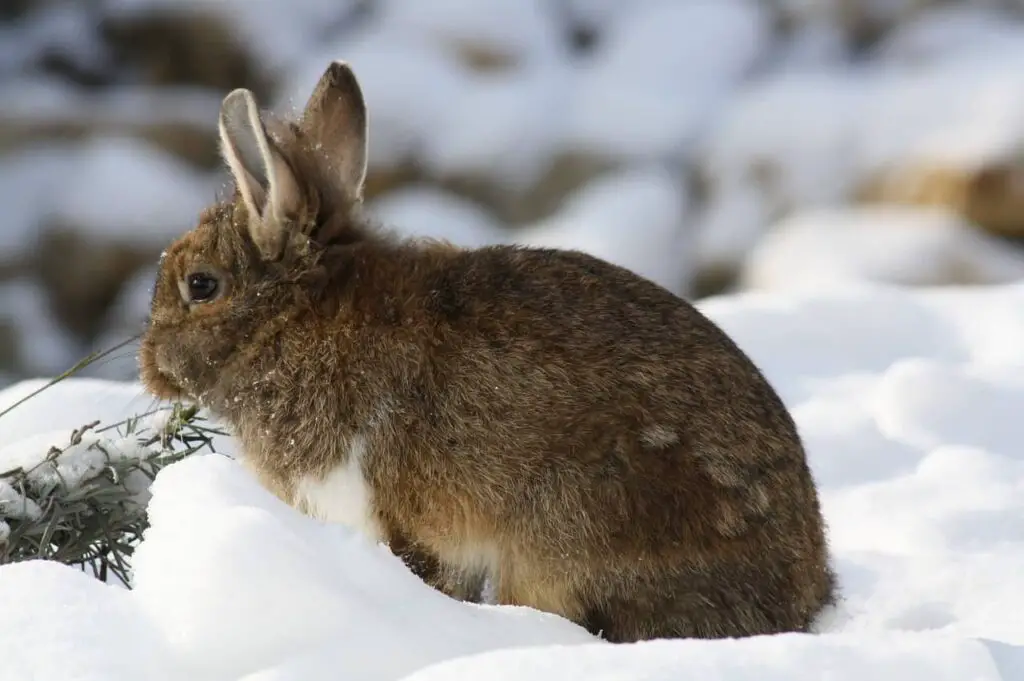
How do you know if a rabbit is hibernating?
If you pose this question to a gardener, they will have the answer for you quite easily. No, rabbits do not hibernate. They are pulling up their vegetables and other plants all year long. In fact, you are more likely to see rabbits throughout the winter because food is harder to find.
Understanding Hibernation
Hibernation is a survival strategy employed by certain animals to survive periods of extreme cold when food sources are scarce. During hibernation, an animal’s body temperature drops significantly, and its metabolism slows down drastically. This allows the animal to conserve energy by slowing its bodily functions, effectively “sleeping” through the winter until conditions improve.
Rabbit Behaviors
Unlike true hibernators, rabbits do not experience such extreme changes in metabolic activity and body temperature. Instead, rabbits have evolved to adapt to colder temperatures by developing a variety of behaviors that help them survive. One common behavior is “thermal regulation,” where rabbits utilize their burrows and thick fur coats to stay warm.
Signs of Rabbit Hibernation
Rabbits are crepuscular animals, meaning they are most active during dawn and dusk. If you notice your rabbit becoming less active during colder months and spending more time in its burrow or a sheltered area, it might simply be displaying its natural tendencies. However, if your rabbit exhibits extreme lethargy, a significant drop in body temperature, and a decrease in food and water consumption, it might be experiencing a health issue rather than hibernation.
Do all rabbits hibernate?
No! In fact, there are no rabbit species that hibernate during winter months. Instead, they remain active–and eating–all winter long. That doesn’t mean rabbits are unaffected by the cold, however.
The Diversity of Rabbit Species
Rabbits belong to the family Leporidae, which includes a wide variety of species with distinct characteristics and behaviors. These species have evolved differently to adapt to their specific habitats and climates, leading to a spectrum of behaviors when it comes to facing cold weather.
Not All Rabbits Hibernate
Contrary to popular belief, not all rabbits hibernate. In fact, the majority of rabbit species do not enter a true state of hibernation like some other animals. Hibernation is a survival strategy that involves a significant reduction in metabolic rate and body temperature, allowing animals to conserve energy during times of scarce resources. However, rabbits have evolved alternative methods to cope with cold weather.
Winter Adaptations
Rabbits are well-equipped to face the challenges of colder seasons without resorting to hibernation. One key adaptation is their dense fur coat, which provides excellent insulation and helps them retain body heat. Additionally, rabbits often take shelter in burrows or well-hidden areas, which provides protection from harsh weather conditions.
What do rabbits eat in the winter time?
What To Feed Your Rabbit In Winter | The Best Winter Foods …
In cold climates, however, during the winter months, grasses and greens become inaccessible. So, what do wild rabbits eat then? The answer is: a rabbit eats whatever it can find. In the winter months, wild rabbits live on sticks, tree bark, pine needles, and other types of vegetation.
The Versatile Herbivore
Rabbits are herbivores, meaning they rely solely on plant-based foods for their nutritional needs. Their diet predominantly consists of grasses, leaves, stems, and the occasional fruits or vegetables. During winter, when green vegetation becomes scarcer, rabbits adjust their eating habits while utilizing their anatomical and behavioral adaptations to survive.
Winter Foraging Behavior
Despite the challenges posed by cold weather, rabbits are adept foragers, seeking out whatever edible plant material they can find. During winter, they often rely on twigs, bark, and buds from shrubs and trees. Their incisors, continuously growing teeth, enable them to gnaw on woody vegetation, ensuring they have access to food sources even when leafy greens are scarce.
Utilizing Stored Resources
Rabbits are known for their tendency to create food stores, often buried underground or hidden within their burrows. During the warmer months, rabbits gather and stash a variety of plant materials, including grasses, leaves, and even green shoots. These caches serve as a lifeline during winter, allowing rabbits to access nourishment when food is limited.
Do rabbits stop eating in winter?
Rabbits are fairly well-adapted for dealing with the cold, but they must eat more to meet the increased energy requirements for keeping warm. Therefore, the amount of feed provided during the winter months will need to be increased – maybe as much as three times.
Herbivorous Lifestyle
Rabbits are strict herbivores, meaning their diet solely consists of plant-based materials. They consume a variety of plant parts, such as grasses, leaves, stems, and occasionally fruits and vegetables. Their nutritional requirements remain constant throughout the year, regardless of the season.
Adjusting to Scarcity
While rabbits do not entirely stop eating during winter, their dietary preferences and food availability can change. As the green foliage dwindles and vegetation becomes scarcer due to frost and snow, rabbits must adapt to the altered food landscape.
Winter Foraging Behavior
Rabbits are skilled foragers, and their survival instincts shine during the colder months. They seek out available food sources such as twigs, bark, and buds from shrubs and trees. The structure of their teeth – continuously growing incisors – allows them to gnaw on woody vegetation, ensuring they can access nourishment when leafy greens are limited.
Stored Food Reserves
One of the intriguing adaptations rabbits have is their habit of creating food caches. During more abundant times, rabbits gather and stash plant materials such as grasses and leaves, often hidden in their burrows or other hidden spots. These stored resources serve as a crucial backup when fresh vegetation is scarce, helping rabbits meet their nutritional needs during winter.
Do indoor rabbits hibernate?
Rabbits & Winter – The Healthy Pet Club
It’s important to remember that rabbits DO NOT hibernate. Often signs of serious illness are accidentally overlooked during the winter time, as owners think that their rabbits are hibernating.
Indoor Rabbit Environment
Indoor rabbits are sheltered from the harsh outdoor conditions, which allows them to maintain a more stable environment. Unlike outdoor rabbits that experience fluctuations in temperature and food availability, indoor rabbits enjoy consistent temperatures and a continuous supply of food and water.
The Absence of Natural Triggers
Hibernation is triggered by various environmental cues, including decreasing temperatures, reduced food availability, and shorter daylight hours. These triggers signal to wild animals that it’s time to enter a state of reduced metabolic activity to conserve energy. Indoor rabbits, however, lack these cues in their controlled environment.
Physiological Differences
Unlike true hibernators, rabbits do not have the same physiological adaptations that enable them to enter a deep hibernation state. Hibernation involves a significant drop in body temperature and metabolic rate, which allows animals to survive with minimal food intake for extended periods. Rabbits are not naturally equipped for such extreme changes.
Do rabbits sleep at night?
Nope! Another question that people often ask is whether rabbits sleep mostly during the day or at night. And the answer is neither. They are crepuscular, meaning that they are most active at dusk and dawn.
Crepuscular Creatures
Rabbits are considered crepuscular animals, which means they are most active during the hours of dawn and dusk. This behavior is rooted in their evolutionary history as prey animals. Being active during these low-light periods allows them to avoid predators while foraging for food and engaging in social interactions.
Daytime Rest and Alertness
While rabbits are not strictly nocturnal, they do spend a significant amount of time resting during the day. Rabbits have evolved a unique sleep-wake cycle that involves periods of both deep rest and alert wakefulness. They are known for their ability to take short, light naps throughout the day, often with their eyes open to stay vigilant against potential threats.
Light Sleep and Alertness
Rabbits have a particularly keen sense of hearing and awareness of their surroundings. Their sleep is often characterized by light, easily disrupted periods of rest. Even while dozing off, rabbits can spring into action at the slightest sound or movement, which is a survival trait honed over generations of avoiding predators.
Do rabbits fully sleep?
When rabbits are fully asleep, their noses will slow down and stop twitching altogether. They will either be flopped over on their side or fluffed up into a bunny loaf. Rabbits also tend to be light sleepers. Instead of getting one long resting period, they will take many mini naps throughout the day and night.
The Rabbit Sleep-Wake Cycle
Rabbits possess a sleep-wake cycle that differs from that of humans and many other animals. Instead of distinct periods of deep sleep and wakefulness, rabbits experience a unique blend of alertness and restfulness throughout both day and night.
Light Sleep and Vigilance
Rabbits are known for their cautious nature, which is a result of their position in the food chain as prey animals. Even when they appear to be resting, rabbits often maintain a state of light sleep where they can quickly rouse themselves in response to any potential threats. This ability to stay vigilant while dozing is a survival adaptation honed over generations.
Napping Behavior
Rabbits are crepuscular creatures, meaning they are most active during dawn and dusk. Throughout the day, they engage in a series of short, light naps. These naps serve both as a means of conserving energy and as a way to avoid predation. Rabbits are known to sleep with their eyes open, making it easier for them to detect movement or danger.
REM Sleep in Rabbits
Rapid Eye Movement (REM) sleep is a phase of sleep associated with vivid dreaming and heightened brain activity in humans. While rabbits do experience REM sleep, it’s difficult to ascertain the depth of their dreaming experiences due to their unique sleep patterns and the continuous alertness they maintain even during rest.
How long do rabbits live as a pet?
Rabbits generally live for 5 to 8 years depending on their environment and breed, but they can live for as long as 12 years. If you decide to purchase a rabbit, make sure you are prepared to care for them that long.04-Jun-2020
Lifespan Variability
The lifespan of a pet rabbit can vary significantly based on several factors, including genetics, diet, living conditions, veterinary care, and overall well-being. On average, domesticated rabbits tend to live between 8 to 12 years, but some can live even longer with proper care.
Breed Influence
Different rabbit breeds have varying lifespans. Smaller breeds, such as Netherland Dwarfs and Mini Lops, often have longer lifespans compared to larger breeds like Flemish Giants. However, individual care and genetics play a significant role in determining how long a rabbit will live.
Diet and Nutrition
A balanced and appropriate diet is essential for the health and longevity of pet rabbits. Providing high-quality hay, fresh vegetables, and a limited amount of rabbit pellets contributes to their nutritional well-being. Proper nutrition helps prevent obesity, dental issues, and other health problems that could affect their lifespan.
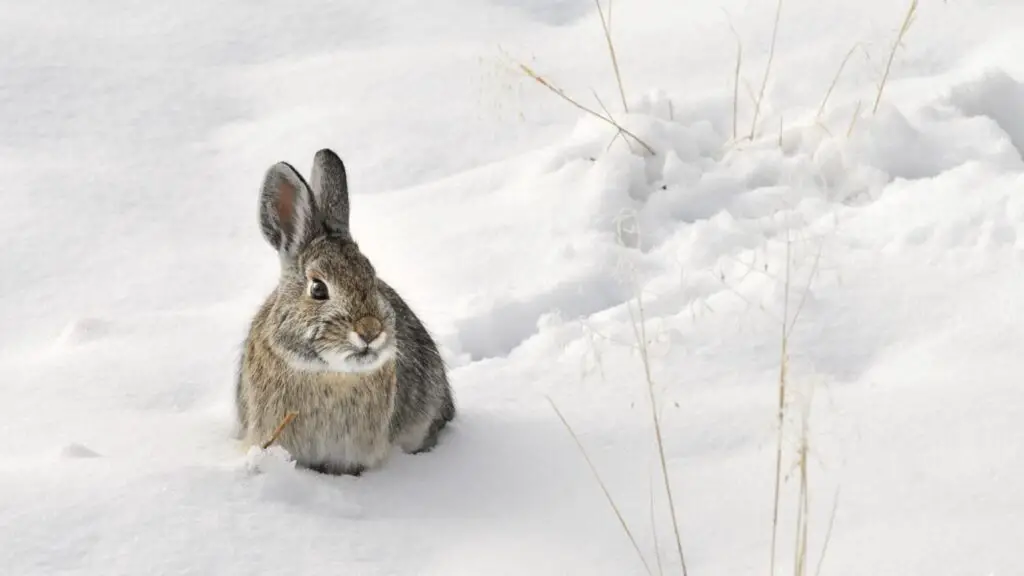
Conclusion
In the world of animal behavior, the question of whether rabbits hibernate or not brings to light their remarkable adaptations to survive in diverse environments. Unlike many other mammals, rabbits do not enter a prolonged and deep state of torpor known as hibernation. Instead, they employ a range of strategies to endure the challenges of winter.
Rabbits have evolved with dense fur for insulation, efficient digestive systems to maximize nutrient extraction, and a unique activity pattern that takes advantage of warmer periods during dawn and dusk. While they do experience a form of reduced activity known as winter lethargy, it is not as profound or prolonged as true hibernation. This adaptive behavior allows rabbits to navigate periods of food scarcity and cold temperatures without the need to enter a state of extended dormancy.
The fact that rabbits do not rabbits hibernate demonstrates the incredible diversity of survival strategies that have evolved in the animal kingdom. From their agile movements to their efficient physiological mechanisms, rabbits continue to captivate our curiosity and provide insights into the myriad ways in which life adapts to the challenges posed by the changing seasons.

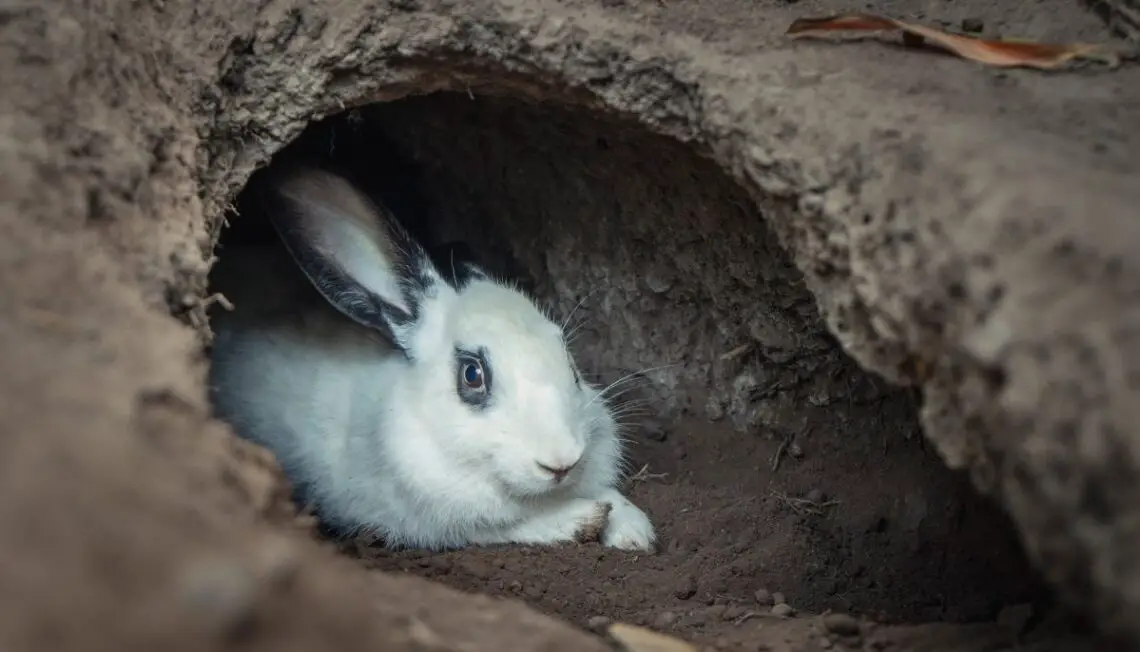
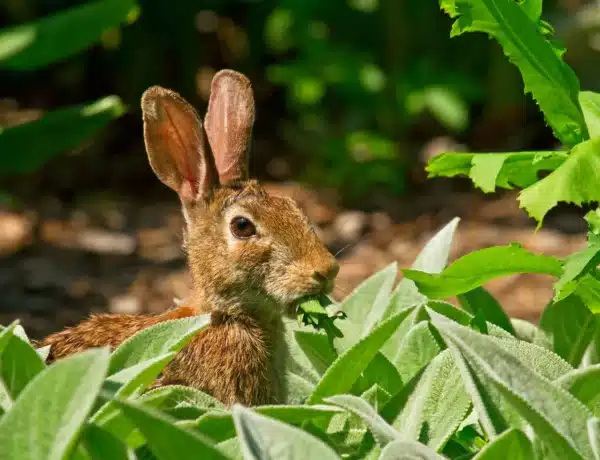
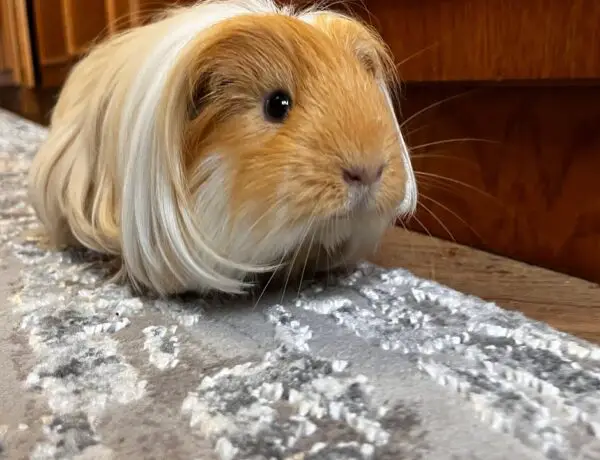
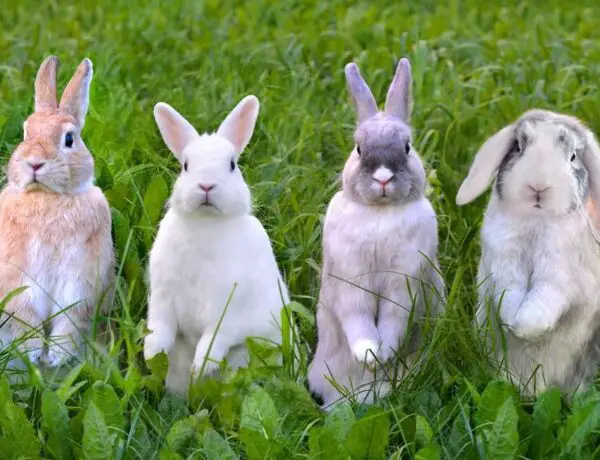
No Comments